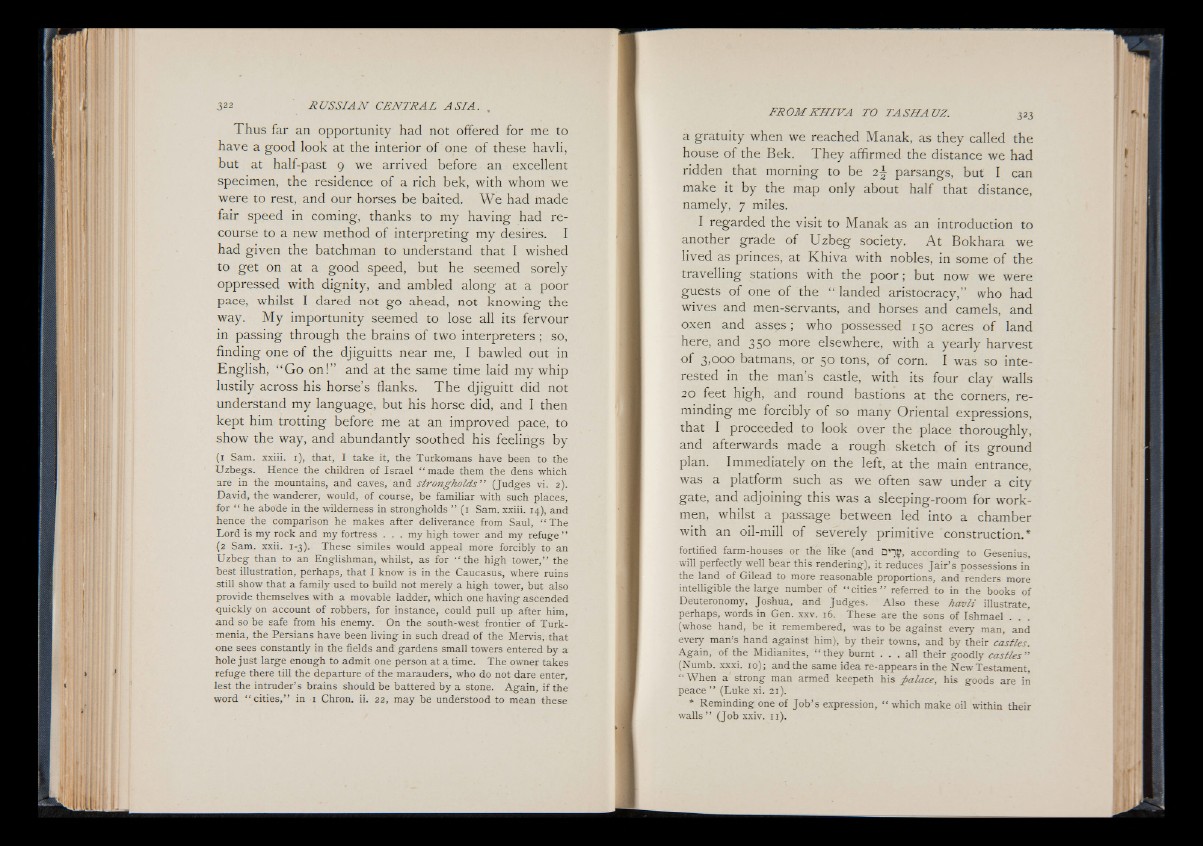
Thus far an opportunity had not offered for me to
have a good look at the interior of one of these havli,
but at half-past 9 we arrived before an excellent
specimen, the residence o f a rich bek, with whom we
were to rest, and our horses be baited. We had made
fair speed in coming, thanks to my having had recourse
to a new method of interpreting my desires. I
had given the batchman to understand that I wished
to get on at a good speed, but he seemed sorely
oppressed with dignity, and ambled along at a poor
pace, whilst I dared not go ahead, not knowing the
way. My importunity seemed to lose all its fervour
in passing through the brains of two interpreters; so,
finding one o f the djiguitts near me, I bawled out in
English, “ Go on!” and at the same time laid my whip
lustily across his horse’s flanks. The djiguitt did not
understand my language, but his horse did, and I then
kept him trotting before me at an improved pace, to
show the way, and abundantly soothed his feelings by
(1 Sam. xxiii. i), that, I take it, the Turkomans have been to the
Uzbegs. Hence the children of Israel “ made them the dens which
are in the mountains, and caves, and strongholds ’ ’ (Judges vi. 2).
David, the wanderer, would, of course, be familiar with such places,
for “ he abode in the wilderness in strongholds ” (1 Sam. xxiii. 14), and
hence the comparison he makes after deliverance from Saul, “ The
Lord is my rock and my fortress . . . my high tower and my refuge ”
{2 Sam. xxii. 1-3). These similes would appeal more forcibly to an
Uzbeg than to an Englishman, whilst, as for “ the high tower,” the
best illustration, perhaps, that I know is in the Caucasus, where ruins
still show that a family used to build not merely a high tower, but also
provide themselves with a movable ladder, which one having ascended
quickly on account of robbers, for instance, could pull up after him,
and so be safe from his enemy. On the south-west frontier of Turkmenia,
the Persians have been living in such dread of the Mervis, that
one sees constantly in the fields and gardens small towers entered by a
hole just large enough to admit one person at a time. The owner takes
refuge there till the departure of the marauders, who do not dare enter,
lest the intruder’s brains should be battered by a stone. Again, if the
word “ cities,” in 1 Chron. ii. 22, may be understood to mean these
a gratuity when we reached Manak, as they called the
house of the Bek. They affirmed the distance we had
ridden that morning to be 2\ parsangs, but I can
make it by the map only about half that distance,
namely, 7 miles.
I regarded the visit to Manak as an introduction to
another grade of Uzbeg society. A t Bokhara we
lived as princes, at Khiva with nobles, in some o f the
travelling stations with the poor; but now we were
guests of one of the “ landed aristocracy,” who had
wives and men-servants, and horses and camels, and
oxen and asses; who possessed 150 acres o f land
here, and 350 more elsewhere, with a yearly harvest
of 3,000 batmans, or 50 tons, of corn. I was so interested
in the man’s castle, with its four clay walls
20 feet high, and round bastions at the corners, reminding
me forcibly of so many Oriental expressions,
that I proceeded to look over the place thoroughly,
and afterwards made a rough sketch o f its ground
plan. Immediately on the left, at the main entrance,
was a platform such as we often saw under a city
gate, and adjoining this was a sleeping-room for workmen,
whilst a passage between led into a chamber
with an oil-mill o f severely primitive construction.*
fortified farm-houses or the like (and D'Th, according to Gesenius,
will perfectly well bear this rendering), it reduces Jair’s possessions in
the land of Gilead to more reasonable proportions, and renders more
intelligible the large number of “ cities” referred to in the books of
Deuteronomy, Joshua, and Judges. Also these havli illustrate,
perhaps, words in Gen. xxv. 16. These are the sons of Ishmael . . .
(whose hand, be it remembered, was to be against every man, and
every man’s hand against him), by their towns, and by their castles.
Again, of the Midianites, “ they burnt . . . all their goodly castles ”
(Numb. xxxi. 10); and the same idea re-appears in the New Testament,
“ When a' strong man armed keepeth his palace, his goods are in
peace ” (Luke xi. 21).
* Reminding one of Job’ s expression, “ which make oil within their
walls” (Job xxiv. 11).